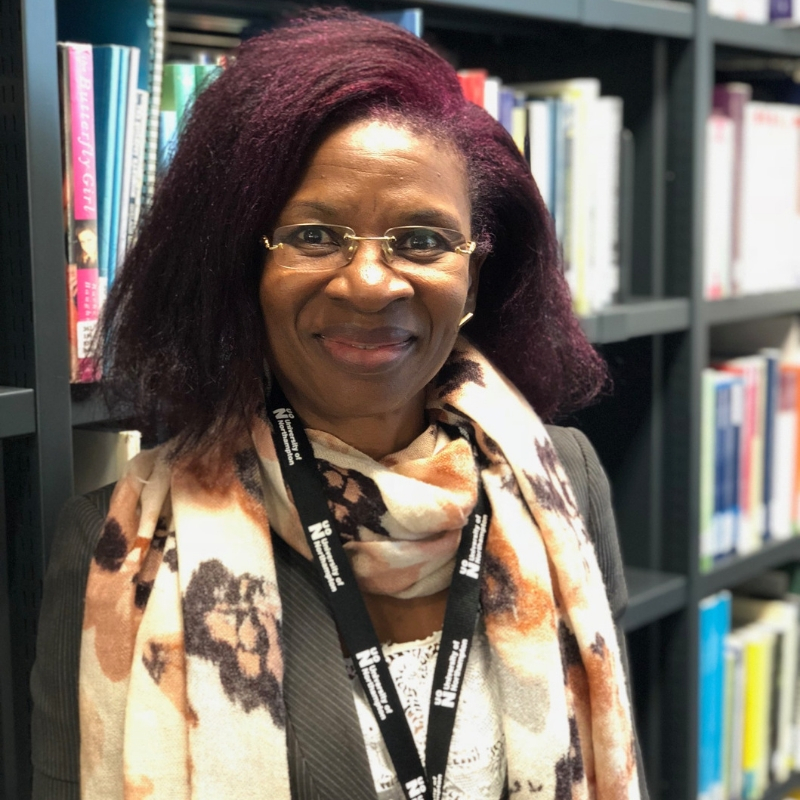#PhDChat with Hilary Gbedemah
Date 12.02.2019
12.02.2019
Hilary Gbedemah, PhD student at the University of Northampton, a Ghanaian expert on the United Nations (UN) Committee on the Elimination of Discrimination against Women (CEDAW) and Human Rights lawyer, took time out of her busy schedule to talk about her PhD research and experience so far studying with the University of Northampton.
Hilary said: “I started my PhD at the University of Northampton back in 2016, as I was keen to delve deeper into gender issues within education in Ghana, my home country. I have over 30 years’ experience as a human rights lawyer, and I have a role with the UN, specifically looking at discrimination against women in society around the world, my PhD supports my career, a natural fit.
“My PhD research has given me the opportunity to work more closely with schools in Ghana, to focus on gender issues, as well as looking at other academic research on the subject. I hope that my research and PhD thesis, once it’s finished, will be able to influence education and social policy decisions in Ghana, to reduce and remove the gender barriers which impact on girls and women.
“For me, tackling gender inequality in education goes further than improving the number of girls and women participating in education – as set out in the Sustainable Development Goals — it means girls having quality education, in a safe and supportive environment, which recognises and tackles the discriminations girls can face; as well as helping them achieve academically.
“As I began my research I quickly saw the differences in the school system in Ghana and the UK; which has thrown up some cultural and ethical challenges for my thesis. The fantastic support of my PhD supervisors, Dr Cristina Devecchi, and Senior Lecturer in Education (Early Years), and Dr Emel Thomas, has been invaluable in helping me to reflect, represent and overcome these challenges so far.
“Through my work with the United Nations, my PhD, and also my work as a pro-bono lawyer, I want to influence policy and societal attitudes across Ghana; breaking down barriers and addressing social discrimination, to enable girls and women to have the same access to, and empowering experiences of education, ultimately giving girls the futures they deserve.”
The Ghanaian government has recognised women’s empowerment, gender equality, and access to education within recent policy developments, but in Hilary’s opinion, there is far more that can be done. In her 30 years working as a lawyer, Hilary witnessed countless examples of gender inequality in education, which remains one of the most prevalent forms of discrimination against women and girls in the patriarchal society.
Hilary continued: “I have seen first-hand how schools can transform children’s lives, but to properly fulfil the full potential for children, the education system must move forwards and become more equitable. Through policy and cultural education, perhaps even lessons in equality—particularly gender equality— should be instilled in students, teachers and the community alike.
“During my research for my PhD, I’ve found evidence that in some schools, girls are asked to leave evening study facilities 15 minutes before their male peers. The schools’ reasoning is that this aims to protect girls from inappropriate sexual attention, which might well be the case, but regardless, these girls are not given the opportunity to make up this time accessing learning resources at another point. Through this simple act, girls are missing out on hours of access to education each year, so how could they fulfil their potential in the same way as boys?”
It is practices like this, which Hilary, through her role on the United Nations Committee on the Elimination of Discrimination against Women tackles. Working with members of the UN treaty, they monitor, review, and make recommendations for development of policies and measures which relate to the elimination of discrimination of women and girls.
Hilary believes that when a girl is empowered and given the right tools to make decisions about her education and future, she is able to change the trajectory of her life – and the lives of her children and the entire community.
Are you a PhD student at the University of Northampton? Get in touch with news@northampton.ac.uk to be part of the next ‘In Conversation’ feature.